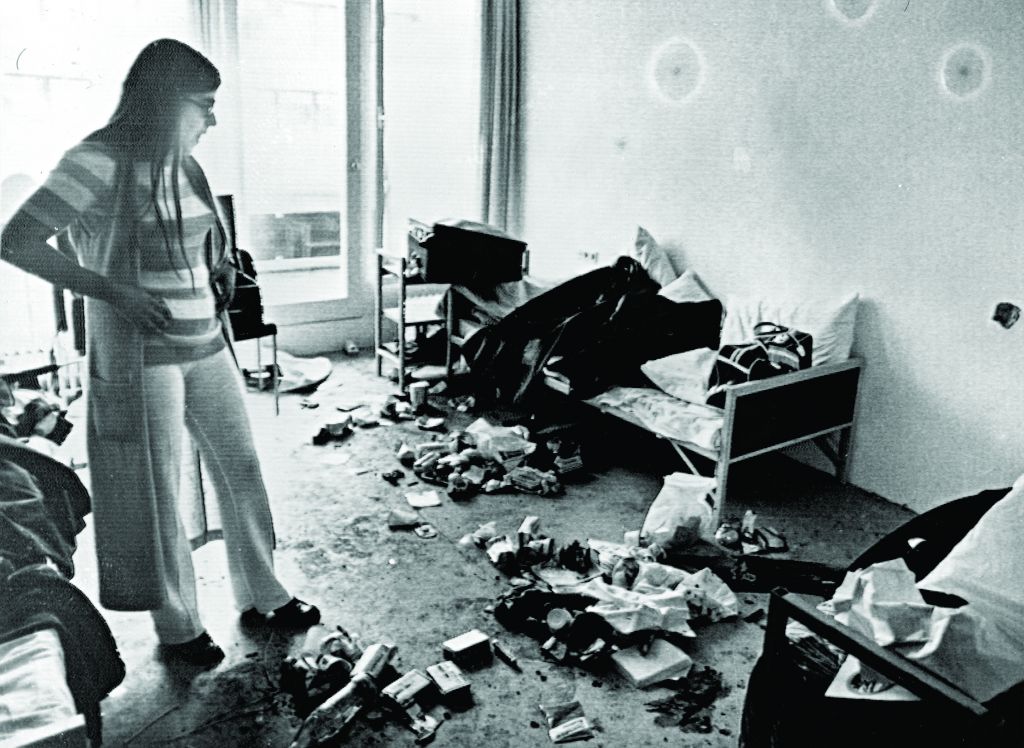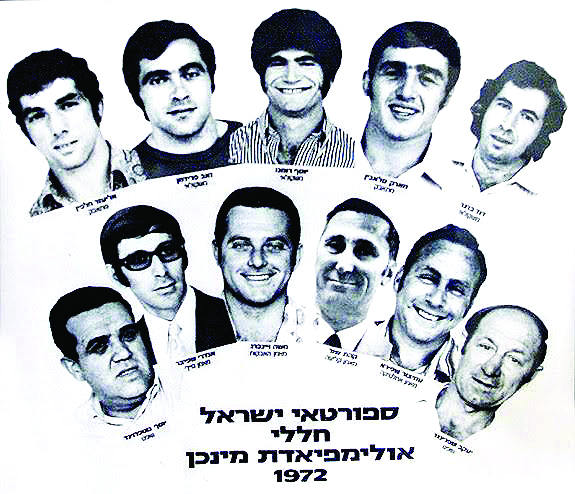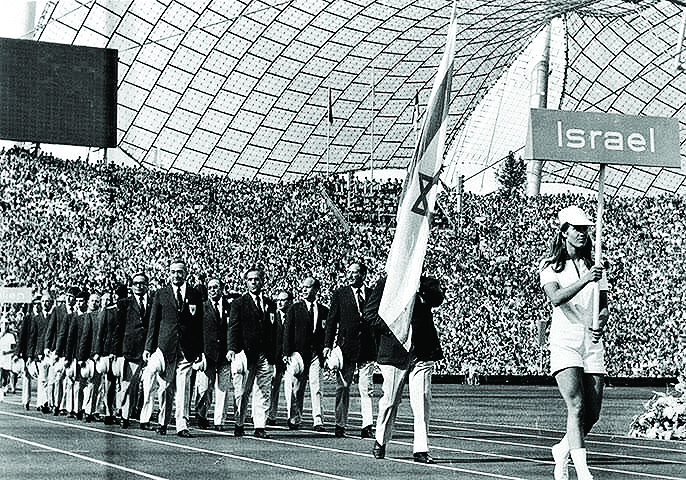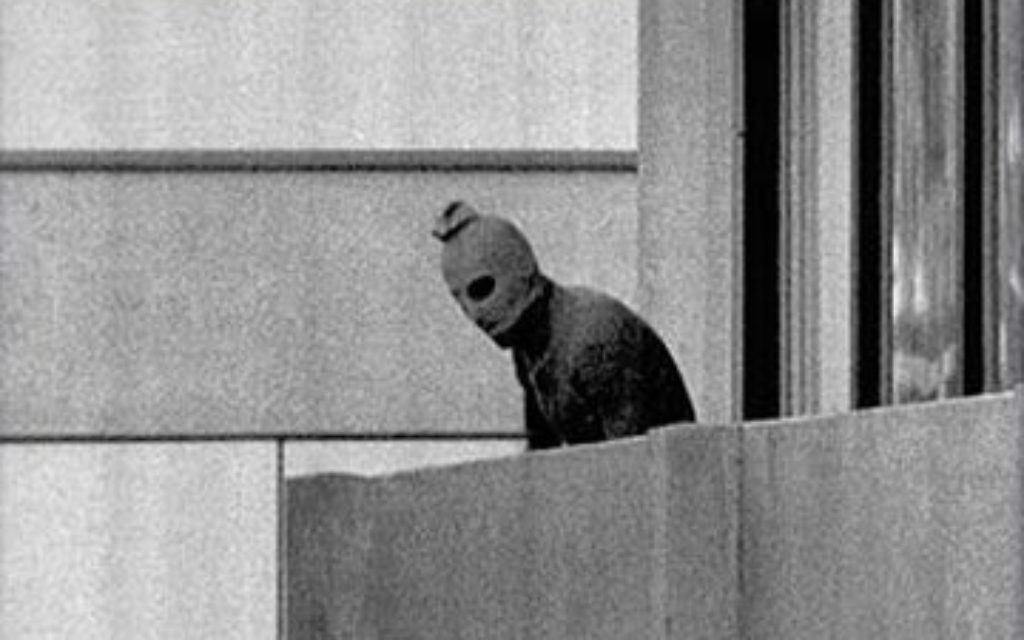Special report: Haunted by Munich – surviving the Olympics’ darkest hour
Dan Alon, a survivor of the Munich Olympic Games massacre of 1972, tells Jenni Frazer how he's carried the horrors of the attack with him for over 40 years
To mark the 45th anniversary of the deadly Munich Massacre – we republish this article from February 2016, reflecting on a survivor’s story, and how he continues to live with the haunting memory.
– – – – – – – – – – – – –
It is 44 years since he saw the sight, but when Dan Alon says: “All the rooms were full of blood”, his eyes fill with tears and for a moment he struggles to continue speaking.
Get The Jewish News Daily Edition by email and never miss our top stories Free Sign Up
The former Israeli champion fencer has only been telling his story for the past 10 years, the harrowing account of how he and five other athletes stealthily made their way out of Apartment Two in the Munich Olympic Village in September 1972.
All around them was carnage, as Palestinian terrorists who had stormed the area of the Israeli delegation first killed and mutilated two of their hostages. Subsequently the Palestinians murdered a further nine Israelis as the terrified athletes sat helpless, tied up in helicopters supplied by the German authorities, in an abortive hostage deal.
The day after the massacre, Alon recalled this week, the Israeli team was ordered back to Israel, and those few traumatised survivors – together with some new widows, such as Anke Spitzer, wife of the team’s coach, Andre Spitzer – were asked to pack up the belongings of their murdered colleagues.
With a heavy heart, the 27-year-old Alon headed into Apartment One, where the killings had begun. He asked Anke not to follow him, but she insisted. Besides the overwhelming amount of blood were personal effects and children’s toys, bought by the young fathers on the Israeli team, to take home to their families.

The memories of that week in September 1972 have haunted Alon ever since, and for more than 30 years he never spoke of his experiences, choosing, instead, to throw his energies into his family – he and his South African-born wife have two sons and a daughter – building up his plastics factory business, and giving up fencing. Instead, he plays golf.
But as he recalled at a fundraising dinner for the British Friends of Yad Sarah, the Israeli disability charity, he was persuaded to write a book about Munich, which was published in 2012.
And, for the first time, his wife and family heard about the anger he harboured, not just towards the Palestinian terrorists, but to the German authorities who, he believes, bungled the rescue operation. And Alon remains very angry about the Israeli Olympic Committee, which sent a delegation to the Games “without any security”.
“You know,” he said, speaking to Jewish News before his address, ”two years before the Olympic attack there was a terrorist attack in Munich.” It was an attack on an El Al bus at Munich airport, in which three passengers were killed. Alon believes there should have been heightened awareness about Israeli security at the Munich Games in the wake of this attack. “When I was writing my book, I had many interviews with Mossad agents and I asked them, why was there no protection for us? And they didn’t have any answers.”

Although some members of the surviving team pleaded to stay on in Munich and take part in the closing ceremony of the Games, permission was refused by the Israeli government.
Asked today if he feels the Games should have been suspended, Alon shakes his head. “No, if they had stopped the Games, the other athletes who had trained for four years to get there would only have blamed Israel.” But he is pessimistic about the chances of a proper commemoration of his murdered colleagues within the Games’ opening ceremony in Rio this summer.
He said: “It’s all politics. The Arab nations on the International Olympic Committee said they would only agree to a minute’s silence for the dead Israelis if there were another minute’s silence for the dead ‘freedom fighters,’” Alon laughs bitterly.”Freedom fighters? They were terrorists, pure and simple. It’s only recently that it’s been revealed how they mutilated some of the Israeli hostages. Freedom fighters don’t do that”.

The killings in Munich, by Alon’s account, were a dreadful series of coincidences and luck. A rapt Yad Sarah audience heard how Andre Spitzer came to be among the dead. A close friend of Alon, Spitzer had been granted a 24-hour pass by theIsraeli Olympic team to leave Munich and go to the Netherlands to visit Anke and their new, but sick, baby daughter, Anouk. According to Alon, Spitzer was ready to extend his leave and stay on in the Netherlands.
But Anke insisted that he had to return and represent his country. So she drove him to the station, but he missed his train. Spitzer would have turned back but Anke drove on to the next stop. He missed that train, too. Finally he caught the train, arriving in Munich just four hours before the murders began.
Alon escaped death by luck and inches. He was among a group of Israelis who had gone to Munich two weeks before the Games to train with their German counterparts on the fencing team.
The fencers were taken to the Olympic Village and asked to choose from the then-empty apartments.
Unhesitatingly, Alon picked Apartment Two.
“I tried to persuade Andre Spitzer to join me, but he wouldn’t; he went to Apartment One”. So it was that Apartment One was occupied by the Israeli coaches, Apartment Three by the wrestlers and weightlifters, and Apartments Four and Five by doctors and officials.
When the shootings began, Alon recalled, he and team-mate Yehuda Weinstein, then just 17, together with two marksmen from the Israeli team, huddled in Apartment Two. They had rifles belonging to the marksmen and debated shooting one of the terrorists, stationed outside their door. But eventually they thought that doing so would draw attention to their presence, and instead, with great stealth, made their way down the creaking wooden stairs of the duplex apartment, jumped out of the window one by one, over a fence, and into the waiting arms of the German police.
As he escaped, Alon turned round to see one of the armed terrorists watching him. “I will never know why he did not shoot me,” he says.
The one-time champion fencer is the son of a Hungarian-born champion fencer, who became his first coach. In turn Alon’s son Arik became an Israeli fencing champion – and now Arik’s son, aged five, is likely to be the fourth generation to take up the sport.

Thank you for helping to make Jewish News the leading source of news and opinion for the UK Jewish community. Today we're asking for your invaluable help to continue putting our community first in everything we do.
For as little as £5 a month you can help sustain the vital work we do in celebrating and standing up for Jewish life in Britain.
Jewish News holds our community together and keeps us connected. Like a synagogue, it’s where people turn to feel part of something bigger. It also proudly shows the rest of Britain the vibrancy and rich culture of modern Jewish life.
You can make a quick and easy one-off or monthly contribution of £5, £10, £20 or any other sum you’re comfortable with.
100% of your donation will help us continue celebrating our community, in all its dynamic diversity...
Engaging
Being a community platform means so much more than producing a newspaper and website. One of our proudest roles is media partnering with our invaluable charities to amplify the outstanding work they do to help us all.
Celebrating
There’s no shortage of oys in the world but Jewish News takes every opportunity to celebrate the joys too, through projects like Night of Heroes, 40 Under 40 and other compelling countdowns that make the community kvell with pride.
Pioneering
In the first collaboration between media outlets from different faiths, Jewish News worked with British Muslim TV and Church Times to produce a list of young activists leading the way on interfaith understanding.
Campaigning
Royal Mail issued a stamp honouring Holocaust hero Sir Nicholas Winton after a Jewish News campaign attracted more than 100,000 backers. Jewish Newsalso produces special editions of the paper highlighting pressing issues including mental health and Holocaust remembrance.
Easy access
In an age when news is readily accessible, Jewish News provides high-quality content free online and offline, removing any financial barriers to connecting people.
Voice of our community to wider society
The Jewish News team regularly appears on TV, radio and on the pages of the national press to comment on stories about the Jewish community. Easy access to the paper on the streets of London also means Jewish News provides an invaluable window into the community for the country at large.
We hope you agree all this is worth preserving.
-
By Laurent Vaughan - Senior Associate (Bishop & Sewell Solicitors)
-
By Laurent Vaughan - Senior Associate (Bishop & Sewell Solicitors)
-
By Laurent Vaughan - Senior Associate (Bishop & Sewell Solicitors)
-
By Laurent Vaughan - Senior Associate (Bishop & Sewell Solicitors)






















